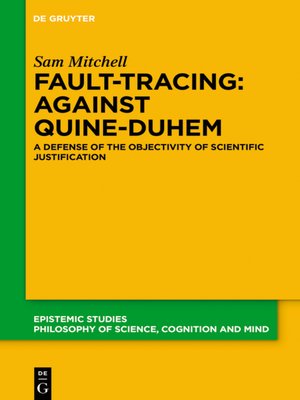Fault-Tracing
ebook ∣ Against Quine-Duhem: A Defense of the Objectivity of Scientific Justification · Epistemic Studies
By Sam Mitchell

Sign up to save your library
With an OverDrive account, you can save your favorite libraries for at-a-glance information about availability. Find out more about OverDrive accounts.
Find this title in Libby, the library reading app by OverDrive.



Search for a digital library with this title
Title found at these libraries:
| Library Name | Distance |
|---|---|
| Loading... |
It is widely believed in philosophy of science that nobody can claim that any verdict of science is forced upon us by the effects of a physical world upon our sense organs and instruments. The Quine-Duhem problem supposedly allows us to resist any conclusion. Views on language aside, Quine is supposed to have shown this decisively.
But it is just false. In many scientific examples, there is simply no room to doubt that a particular hypothesis is responsible for a refutation or established by the observations.
Fault Tracing shows how to play independently established hypotheses against each other to determine whether an arbitrary hypothesis needs to be altered in the light of (apparently) refuting evidence. It analyses real examples from natural science, as well as simpler cases. It argues that, when scientific theories have a structure that prevents them from using this method, the theory looks wrong, and is subject to serious criticism. This is a new, and potentially far-reaching, theory of empirical justification.







